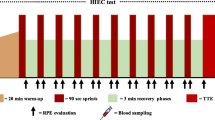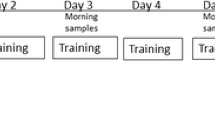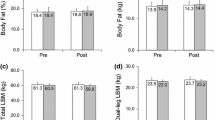Abstract
The aim of the present study was to investigate the effect of protein diets, rich in branched chain amino acids (BCAA) on perceived exertion, mental and physical performance during an offshore sailing race that lasted 32 h. Twelve sailors were randomly allocated into one of two groups [Control (CON) and BCAA: n = 6/group]. The BCAA group consumed a standard diet of 11.2 MJ day−1 (58% carbohydrate, 30% fat, 12% Protein) along with a high-protein supplement of 1.7 MJ day−1 (40% carbohydrate, 35% protein, 25% fat) and 1.7 MJ day−1 composed of 50% valine, 35% leucine, and 15% isoleucine. CON was given a standard diet of 14.5 MJ day−1 (58% carbohydrate, 30% fat and 12% protein). During the race, heart rate was monitored. Subjects self-evaluated their feeling of fatigue every 3 h, and 12 samples of saliva from each subject were collected to perform cortisol assays. Before and after the race a vertical jump and a handgrip test were performed, and mental performance was evaluated with a standardized battery of tests. A significant increase in the feeling of fatigue was noted on the second day (D2) of race in both groups; the increase was higher in CON (P < 0.05). For both groups, salivary cortisol concentration followed a nycthemeral rhythm, with an alteration during the race as evidenced by high midnight cortisol levels between D1 and D2, and significantly decreased cortisol levels observed on D2 (P < 0.05). There was no change in physical performance at the end of the race in both groups. As a significant decrease (P < 0.05) in short-term memory performance was observed only in the CON group. These data indicate that an offshore sailing race enhances the feeling of fatigue, and decreases short-term memory performance. These detrimental consequences are reduced by a high-protein diet with BCAA.


Similar content being viewed by others
References
Abercrombie NH, Kalin NH, Thurow ME, Rosenkranz MA, Davidson RJ (2003) Cortisol variation in humans affects memory for emotionally laden and neutral information. Behav Neurosci 117:505–516. doi:10.1037/0735-7044.117.3.505
Bachemont F, Fouillot JP, Izou M (1984) Study of heart rate in a dinghy and windsurfing by ambulatory monitoring. Union Med Can 113:644–647
Beckwith TV, Petros TV, Scaglione C, Nelson J (1986) Dose-dependent effects of hydrocortisone on memory in human males. Physiol Behav 36:283–286. doi:10.1016/0031-9384(86)90017-X
Bigard AX, Lavier P, Ullmann L, Legrand H, Douce P, Guezennec CY (1996) Branched-chain amino acid supplementation during repeated pralonged skiing exercises at altitude. Int J Sports Med 6:295–306
Bigard AX, Guillemot PY, Chauve JY, Duforez F, Portera P, Guezennec CY (1998) Nutrient intake of elite sailors during a solitary long-distance offshore race. Int J Sports Med 8:364–376
Bird SP, Tarpenning K, Marino F (2006) Effects of liquid carbohydrate/essential amino acid ingestion on acute hormonal response during a single bout of resistance exercise in untrained men. Nutrition 22:367–375. doi:10.1016/j.nut.2005.11.005
Blomstrand E, Hassmen P, Ekblom B, Newsholme EA (1991) Administration of branched-chain amino acids during sustained exercise—effects on performance and on plasma concentration of same amino acids. Eur J Appl Physiol 63:83–88. doi:10.1007/BF00235174
Blomstrand E, Hassmen P, Ek S, Ekblom B, Newsholme EA (1997) Influence of ingesting a solution of branched-chain amino acids on perceived exertion during exercise. Acta Physiol Scand 159:41–49. doi:10.1046/j.1365-201X.1997.547327000.x
Bosco C, Luhtanen P, Komi PV (1983) A simple method for measurement of mechanical power in jumping. Eur J Appl Physiol Occup Physiol 50:273–282. doi:10.1007/BF00422166
Branth S, Hambraeus L, Westerterp K, Andersson A, Edsgren R, Mustelin M et al (1996) Energy turnover in a sailing crew during offshore racing around the world. Med Sci Sports Exerc 28:1272–1276. doi:10.1097/00005768-199610000-00010
Calders P, Matthys D, Derave W, Pannier JL (1999) Effect of branched-chain amino acids (BCAA), glucose, and glucose plus BCAA on endurance performance in rats. Med Sci Sports Exerc 31:583–587. doi:10.1097/00005768-199904000-00015
Cunliffe A, Obeid OA, Powell-Tuck J (1997) Post-prandial changes in measures of fatigue: effect of a mixed or a pure carbohydrate or pure fat IDeal. Eur J Appl Physiol 57:831–838
Danguir L, Nicolaidis S (1979) Dependance of sleep on nutriment’s availability. Physiol Behav 22:735–740. doi:10.1016/0031-9384(79)90240-3
Davis JM, Bailey SP, Woods JA, Galiano FJ, Hamilton M, Bartoli WP (1992) Effects of carbohydrate feedings on plasma free-tryptophan and branched-chain amino acids during prolonged cycling. Eur J Appl Physiol 65:509–513. doi:10.1007/BF00602357
Davis JM, Welsh RS, De Volve KL, Alderson NA (1999) Effects of branched-chain amino acids and carbohydrate on fatigue during intermittent, high-intensity running. Int J Sports Med 20:309–314. doi:10.1055/s-2007-971136
Davis JM, Alderson NL, Welsh RS (2000) Serotonin and central nervous system fatigue: nutritional considerations. Am J Clin Nutr 72:573S–578S
De Kloet RE, Oitzl MS, Joëls M (1999) Stress and cognition: are corticosteroids good or bad guys? Trends Neurosci 10:422–426. doi:10.1016/S0166-2236(99)01438-1
Deijen LB, Wientjes CJE, Vullinghs HF, Clain PA, Langefeld LJ (1999) Tyrosine improves cognitive performance and reduces blood pressure in cadets after one week of a combat training course. Brain Res Bull 48:203–209. doi:10.1016/S0361-9230(98)00163-4
Durnin JV, Rahaman MM (1967) The assessment of the amount of fat in the human body from measurements of skinfold thickness. Br J Nutr 89:147–155
Fernstrow JD, Wurtman RJ (1971) Brain serotonin content: increase following ingestion of carbohydrate diet. Science 174:1023–1025. doi:10.1126/science.174.4013.1023
Fogelholm GM, Lahtinen PK (1991) Nutritional evaluation of a sailing crew during a transatlantic race. Scand J Med Sci Sports 1:99–103
Frankenhauser MA (1989) Biopsychosocial approach to work life issues. Int J Health Serv 19:747–751
Gomez-Merino D, Bequet F, Berthelot M, Riverain S, Chennaoui M, Guezennec CY (2001) Evidence that the branched-chain amino acid L-valine prevents exercise-induced release of 5-HT in rat hippocampus. Int J Sports Med 22:317–322. doi:10.1055/s-2001-15645
Gonzales-Ortiz M, Martinez-Abundis E, Balcazar-Munoz BR, Pascoe-Gonzalez S (2000) Effect of sleep deprivation on insulin sensitivity and cortisol concentration in healthy subjects. Diabetes Nutr Metab 13:80–83
Guezennec CY, Satabin P, Legrand H, Bigard AX (1994) Physical performance and metabolic changes induced by combined prolonged exercise and different energy intake in humans. Eur J Appl Physiol 68:525–530. doi:10.1007/BF00599524
Henderson SA, Black AL, Brooks GA (1985) Leucine turnover and oxidation in trained rats during exercise. Am J Physiol Endocrinol Metab 240:E137–E144
Kirschbaum C, Hellhammer DH (1994) Saliva cortisol in psychoneuroendocrine research: recent developments and applications. Psychoneuroendocrinology 194:313–333. doi:10.1016/0306-4530(94)90013-2
Kirschbaum C, Wolf OT, May M, Wippich W, Hellhammer DH (1996) Stress and treatment induced elevations of cortisol levels associated with impaired dec1arative memory in healthy adults. Life Sci 58:1475–1483. doi:10.1016/0024-3205(96)00118-X
Lac G, Lac N, Robert A (1993) Steroid assays in saliva: a method to detect plasmatic contaminations. Arch Physiol Biochem Biophys 101:257–262. doi:10.3109/13813459309003921
Lagarde D, Batejat D (1995) Disrupted sleep-wake rhythm and performance: advantages of modafinil. Mil Psychol 7:165–191. doi:10.1207/s15327876mp0703_2
Layman DK (2002) Role of leucine in protein metabolism during exercise and recovery. Can J Appl Physiol 27:646–663
Lieberman HR, Suzanne C, Spring BJ, Growdon JH, Wurtman RJ (1982/83) Mood, performance, and pain sensitivity: changes induced by food constituents. J Psychiatr Res 17:135–145. doi:10.1016/0022-3956(82)90015-2
Meeusen R, Watson P, Dvorak J (2006) The brain and fatigue: new opportunities for nutritional interventions? J Sports Sci 24:773–782. doi:10.1080/02640410500483022
Meneses A (1999) 5-HT system and cognition. Neurosci Biobehav Rev 23:1111–1125. doi:10.1016/S0149-7634(99)00067-6
Mougin F, Bourdin H, Simon-Rigaud M, Didier JM, Toubin G, Kantelip JP (1996) Effects of a selective sleep deprivation on subsequent anaerobic performance. Int J Sports Med 17:115–119. doi:10.1055/s-2007-972818
Myles WS (1985) Sleep deprivation, physical fatigue, and the perception of exercise intensity. Med Sci Sports Exerc 17:580–584. doi:10.1249/00005768-198510000-00011
Pardridge WM, Oldendorf WH (1975) Kinetic analysis of blood-brain barrier transport of amino acids. Biochim Biophys Acta 401:128–136. doi:10.1016/0005-2736(75)90347-8
Portier H, Guezennec CY (2003) Oxygen cost assessment during small craft competition. Sci Sports 18:111–113. doi:10.1016/S0765-1597(02)00051-5
Ryman DH, Naitoh P, Englund CE (1985) Decrements in logicial reasoning performance under conditions of sleep loss and physical exercise: the factor of sentence complexity. Percept Mot Skills 61:1179–1188
Verger P, Aymard P, Cynobert L, Anton G, Luigi R (1994) Effects of administration of branched-chain amino acids vs glucose during acute exercise in rats. Physiol Behav 55:523–526. doi:10.1016/0031-9384(94)90111-2
Verger P, Lagarde D, Batejat D, Maitre JF (1998) Influence of the composition of a meal taken after physical exercise on mood, vigilance, performance. Physiol Behav 64:317–322. doi:10.1016/S0031-9384(98)00064-X
Vining RF, Mc Ginley RA, Maksvytis JJ, Ho KY (1987) Salivary cortisol: a better measure of adrenal function than serum cortisol. A Clin Bioch 20:329–335
Welsh RS, Davis JM, Burke JR, Williams HG (2002) Carbohydrates and physical/mental performance during intermittent exercise to fatigue. Med Sci Sports Exerc 34:723–731. doi:10.1097/00005768-200204000-00025
Wurtman JJ (1988) Effects of dietary amino acids, carbohydrates, and choline on neurotransmitter synthesis. Mt Sinai J Med 55:75–85
Author information
Authors and Affiliations
Corresponding author
Rights and permissions
About this article
Cite this article
Portier, H., Chatard, J.C., Filaire, E. et al. Effects of branched-chain amino acids supplementation on physiological and psychological performance during an offshore sailing race. Eur J Appl Physiol 104, 787–794 (2008). https://doi.org/10.1007/s00421-008-0832-5
Accepted:
Published:
Issue Date:
DOI: https://doi.org/10.1007/s00421-008-0832-5




